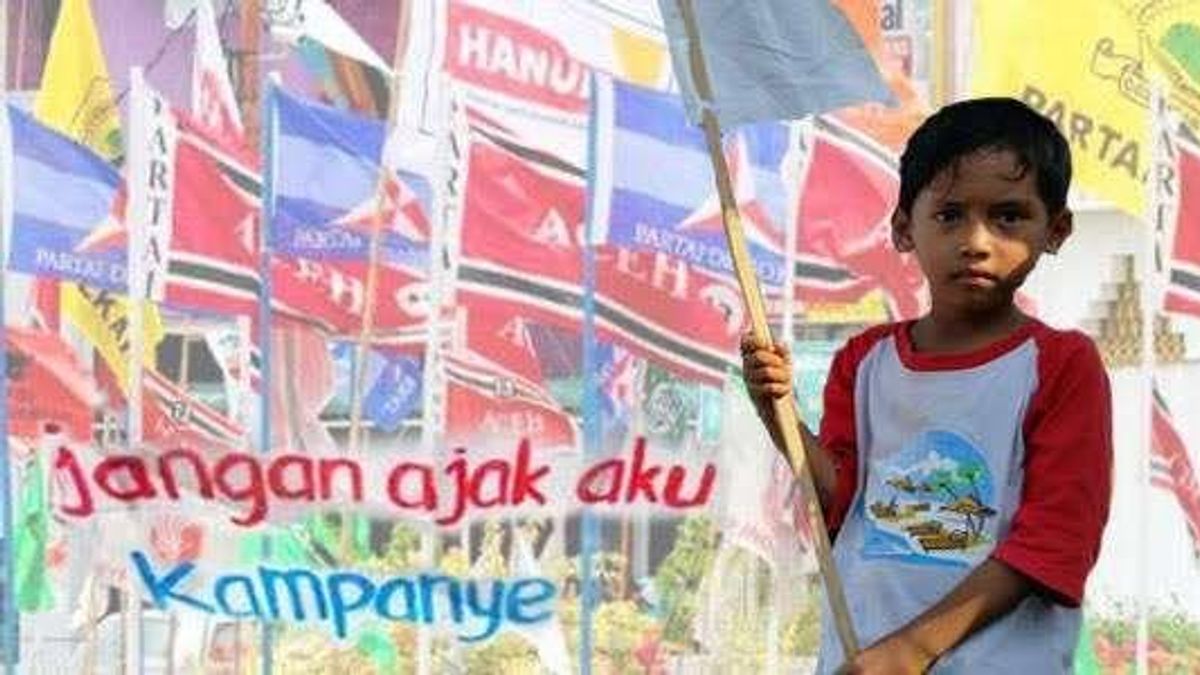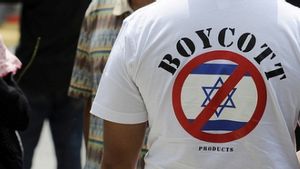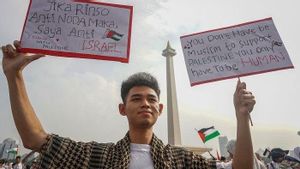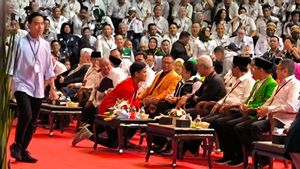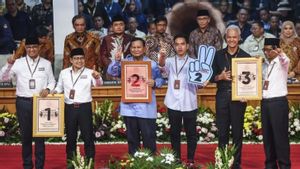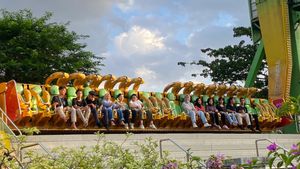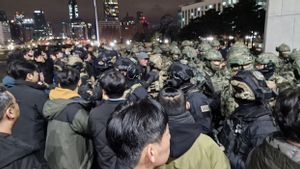JAKARTA Child exploitation in the political year is still a worrying issue, as stated by the Indonesian Child Protection Commission (KPAI).
Concerns regarding the exploitation of children in the election have surfaced ahead of the 2024 Presidential Election (Pilpres) campaign which will start on November 28, 2023 and expires on February 10, 2024, or four days before the voting schedule is held.
Reflecting on previous democratic parties, children are often exploited during the campaign period even after the election.
According to KPAI Commissioner Kaina Apituley, involving children in campaigns is a violation of children's rights. Badminton said that exploitation of children has occurred since the 2014 and 2019 elections.
The campaign itself has been regulated in the Regulation of the General Election Commission of the Republic of Indonesia (PKPU) Number 23 of 2018, which means that it is an activity of election participants or other parties appointed by election participants to convince voters by offering vision, mission, program, and/or self-image of election participants.
Ideally, the campaign was carried out honestly, openly, in an orderly manner so that a safe and peaceful democratic party could be realized.
But the reality on the ground is not like that. Instead of creating a soothing political climate, the moment of the election is actually a matter of division because differences in choice are not handled wisely.
In the last two edition elections, for example, caps and hate each other as if they were a reflection of the general public of Indonesia. The portrait of hate each other that is common is found in campaign content with the contents of good news has the potential to have a negative impact on children's growth and future.
"Various forms of campaign material that are inappropriate and can damage the development of children's emotions and mentality, in the form of agvitations, propaganda, stigma and hoaxes that pit against political opponents, invitations to suspect and hate, as well as politicization of identities that can strain disharmoni, will form negative children's perceptions, attitudes and social behavior as well," he said.
He is also worried that children will label negatives to other people who have different political choices. In fact, differences of opinion in politics are commonplace.
Coinciding with World Children's Day 2023 which falls on November 20, the Minister of Women's Empowerment and Child Protection (PPPA) Bintang Puspayoga invites all parties to provide protection in holding child-friendly elections next year.
"We use the world's children's day as a momentum for the state to be present in terms of child protection in holding the 2024 General Election," said Bintang Puspayoga in Jakarta, quoting Antara, Monday (20/11/2023).
In accordance with Article 16 of Law Number 10 of 2016 concerning Elections and Article 280 of Law Number 7 of 2017 concerning Elections strictly prohibits the involvement of children and people who do not have the right to vote.
It is said that children are still vulnerable to exploitation in every election. He said KPAI noted that there were 15 forms of exploitation and violence against children during the campaign with various modes varied.
"For example, the misuse of children's playgrounds, child care centers, and/or educational places for campaign activities," said hala.
Several other forms of exploitation of children in the election are child mobilization by political parties or regional head candidates. In addition, children are also often used as campaigners to choose candidates for legislative members, presidents, or certain political parties. Children are also often displayed as the main stars of political advertising, even appearing on the campaign stage of political parties even though it is in the form of entertainment.
Another thing that is often found is that we often see children wearing the attributes of political parties or become a tool of political practice of money by political parties and regional head candidates.
Similarly, the General Chairperson of the Indonesian Child Protection Agency (LPAI) Seto Mulyadi emphasized the importance of keeping children away from election campaigns. He emphasized that exploitation of children in the election campaign violates the law and urges the Election Supervisory Body (Bawaslu) to impose strict sanctions on parties who still use children in campaigns.
"Often without realizing it, children are involved in campaigns. Child safety is not being noticed and this is a exploitation of children's politics," said the man who was considered by Kak Seto to VOI.
SEE ALSO:
Involving children in the election campaign is often considered commonplace, because this is a political learning event for children. However, Seto Mulyadi disagrees with this. According to him, learning politics for children does not have to be done by participating in campaigns that are actually considered to ignore children's rights.
"Learning politics for children is not campaigning, but there are other ways. For example, the selection of class leaders in schools. This can also be considered a political lesson because the head of the class was elected, decided with the most votes," added the man who was born on August 28, 1951.
Children's concerns about being victims of political campaigns have actually been voiced by various parties. Including when the Constitutional Court (MK) decided not to ban political campaigns in educational places last August.
The decision number 65/PUU-XXI/2023 sparked a polemic. Campaigns in the educational environment are considered to be a learning arena for students. Campaigns in the educational environment are considered to be able to promote political awareness and active participation among the younger generation. In addition, campaigns in schools are also arguably a means of direct practice to understand the importance of participation in the democratic process.
But on the other hand, campaigns in schools also have negative impacts, including potential horizontal conflicts and bullying. This was revealed by Satriwan Salim as the National Coordinator of the Education and Teacher Association (P2G) during a conversation with VOI.
First, we are worried that schools will become a practical political arena. This will burden teachers, students, parents, and curriculum. Campaign activities in schools also have the potential to interfere with the teaching and learning process," said Satriwan Salim.
In addition, different political preferences between school principals, teachers, and students in the election are also said to threaten harmony in the educational environment. Instead of creating a cool political atmosphere, campaigns in schools can actually have the potential to create bullying when there are differences of opinion.
As explained earlier, the Indonesian people still have not been able to respond to differences in political views wisely, so that potential bullying can occur even in the educational environment.
The English, Chinese, Japanese, Arabic, and French versions are automatically generated by the AI. So there may still be inaccuracies in translating, please always see Indonesian as our main language. (system supported by DigitalSiber.id)
